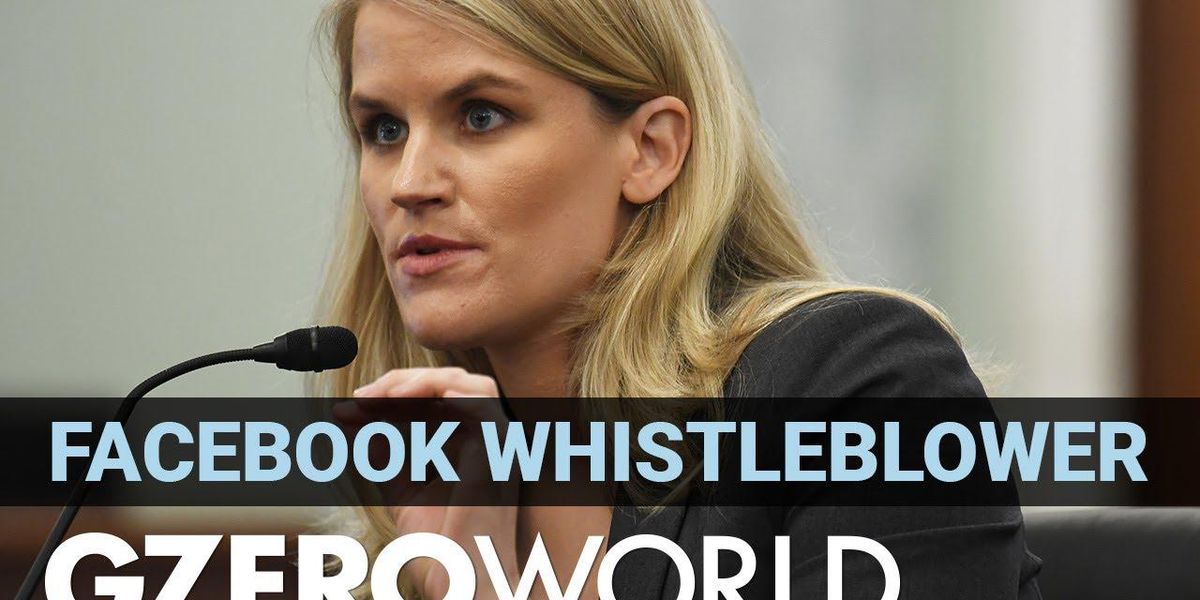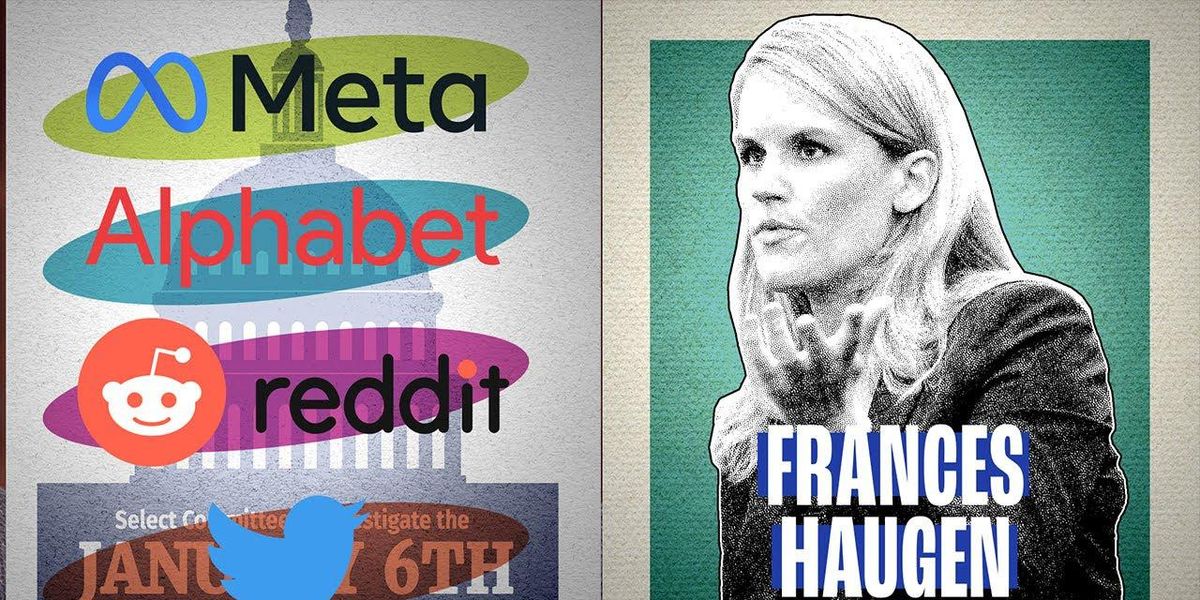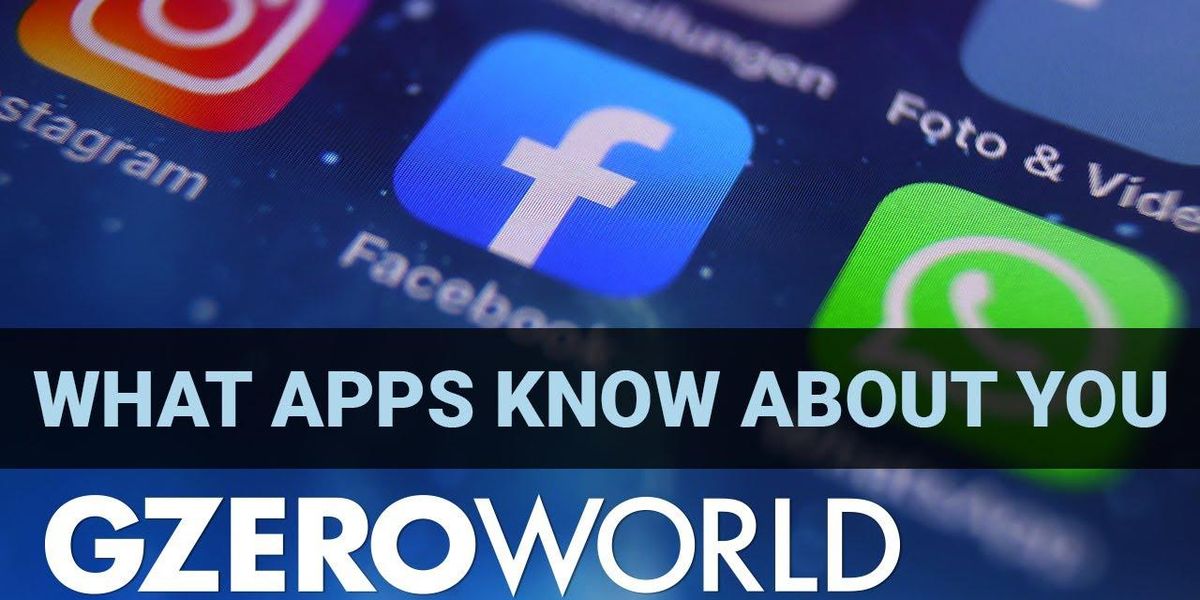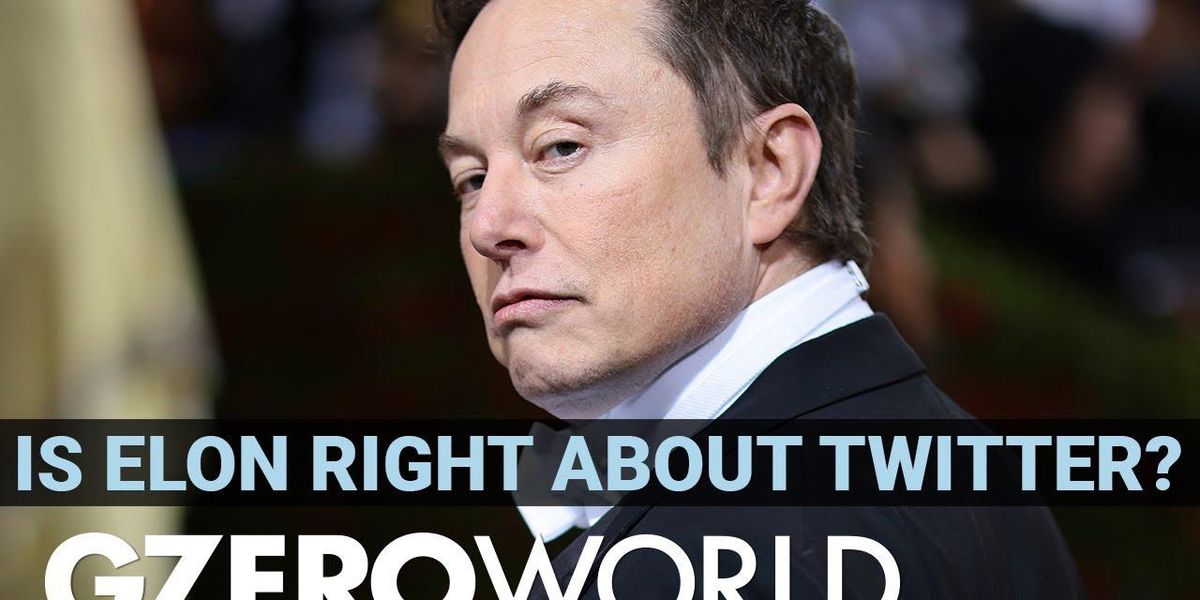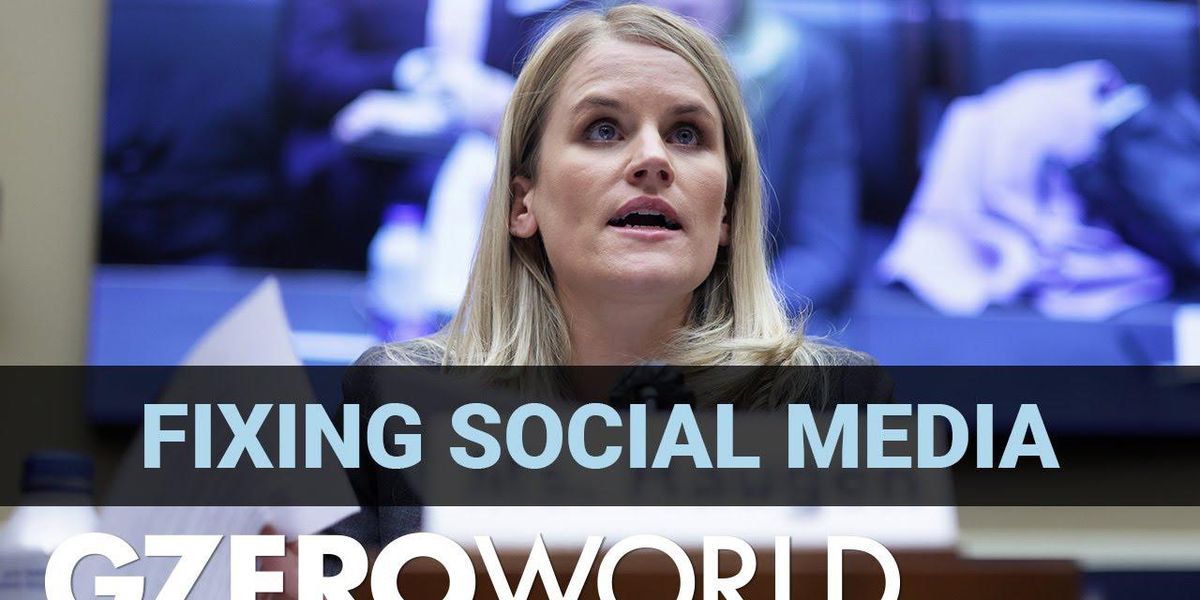Trending Now
We have updated our Privacy Policy and Terms of Use for Eurasia Group and its affiliates, including GZERO Media, to clarify the types of data we collect, how we collect it, how we use data and with whom we share data. By using our website you consent to our Terms and Conditions and Privacy Policy, including the transfer of your personal data to the United States from your country of residence, and our use of cookies described in our Cookie Policy.
{{ subpage.title }}
Tech talent wars & the role of ethics in Big Tech success (long-term)
Facebook whistleblower Frances Haugen still has hope that the corporate culture inside tech companies can change for the better.
"Huge things that seemed impossible [...] all came to be," she says, comparing the idea to historical tectonic shifts like the end of the Cold War or apartheid in South Africa.
Speaking to Ian Bremmer on GZERO World, Haugen says that she doesn't want to tear down social media companies. In fact, she wants them to be successful in the long run "because culture change will come along with that."
Google recently had to ditch a lucrative Pentagon contract in order to retain the best talent.
Facebook, on the other hand, is at a huge disadvantage because it struggles to recruit top talent because of their negative image in the industry.
Watch the GZERO World episode: Why social media is broken & how to fix it
The path to holding social media companies accountable
Facebook whistleblower Frances Haugen thinks governments need to rethink how they regulate social media companies to hold them accountable for the consequences of their actions.
Instead of laws banning specific stuff, which lawyers are very good at skirting, governments should develop legislation that opens conversations about potential problems.
"That's an ongoing, flexible approach to trying to direct them back towards the common good," she tells Ian Bremmer on GZERO World.
Also, Haugen says we must recognize that the gap between fast-changing tech and slow-moving governments will continue to widen. To narrow it, we'll need more whistleblowers — and better laws to protect them.
Watch the GZERO World episode: Why social media is broken & how to fix it
- US in 2022: Smarter social media, more housing & living with COVID ›
- Be more worried about artificial intelligence - GZERO Media ›
- What is Section 230, the 90's law governing the internet? - GZERO ... ›
- Facebook whistleblower Frances Haugen says social media ... ›
- Toxic social media & American divisiveness - GZERO Media ›
Whistleblowers & how to activate a new era of digital accountability
Frances Haugen famously blew the whistle against her then-employer, Facebook. She says we must recognize that the gap between fast-changing tech and slow-moving governments will continue to widen, and the best way to narrow it, is to encourage people to speak out against questionable practices. These whistleblowers need better laws to protect them, she tells Ian Bremmer in a GZERO World interview.
Despite all of this, Haugen still has hope that the corporate culture inside tech companies can change for the better. The role of social media companies in politics is still growing, and now the failures of social media companies can have life-or-death consequences.
Haugen suggests that governments need to rethink how they regulate social media companies, and hold them more accountable for the consequences of their actions.
The EU just approved the Digital Services Act, which for the first time will mandate social media companies be more transparent about what they do with personal data.
If if it works in Europe, the DSA could inspire similar laws in other parts of the world too. Haugen also discusses the preponderance of "bot" accounts on social media, and says companies often choose to ignore the large numbers of fake followers.
How GDPR protects your social media data (even if you accept all cookies)
Why are apps and websites increasingly asking us if we're willing to share our cookies?
The EU's General Data Protection Regulation may be somewhat annoying to the average consumer, but for social media companies it was a wakeup call about the huge amount of private data they'd accumulated, says Facebook whistleblower Frances Haugen.
And that's a slippery slope for the likes of Facebook or Google.
"One of the things that you get as part of GDPR is the right to request any data that a company has on you," Haugen tells Ian Bremmer on GZERO World.
For companies, she says, they were suddenly being asked to disclose just how much stuff they had on you.
Watch the GZERO World episode: Why social media is broken & how to fix it
- Data privacy before and after a pandemic - GZERO Media ›
- Why EU social media regulation matters to you - GZERO Media ›
- The Graphic Truth: Who dominates social media? - GZERO Media ›
- Why social media is broken & how to fix it - GZERO Media ›
- Whistleblowers & how to activate a new era of digital accountability - GZERO Media ›
Was Elon Musk right about Twitter's bots?
The world's richest man is trying to get out of buying Twitter because the social media platform has a lot more fake accounts than he thought.
But does he have a point? Certainly, says Facebook whistleblower Frances Haugen, who even recalls one social network with bots accounting for half of its users.
Companies could easily get rid of fake accounts, Haugen tells Ian Bremmer on GZERO World, but then businesses would lose out.
"If you can have a 1% drop in the number of users on your site, and you can have a 10% drop in the valuation of your company, that's huge," she says, adding that this discourages taking down networks of bots.
Watch the GZERO World episode: Why social media is broken & how to fix it
- Why EU social media regulation matters to you - GZERO Media ›
- Hard Numbers: Musk threatens Twitter, Sri Lanka's president won't ... ›
- The Graphic Truth: Twitter doesn't rule the social world - GZERO Media ›
- Elon Musk to buy Twitter: will misinformation thrive? - GZERO Media ›
- Twitter's scent of Musk - GZERO Media ›
- Whistleblowers & how to activate a new era of digital accountability - GZERO Media ›
- Elon Musk wants a way out of Twitter - GZERO Media ›
Why social media is broken & how to fix it
Social media companies play an outsize role in global politics — from the US to Myanmar. And when they fail, their actions can cost lives.
That's why Frances Haugen blew the whistle against her then-employer, Facebook, when she felt the company hadn't done enough to stop an outrage-driven algorithm from spreading misinformation, hate, and even offline violence.
On GZERO World, Haugen tells Ian Bremmer why governments need to rethink how they regulate social media. A good example is the EU, whose new law mandating data transparency could have global ripple effects.
Haugen also explains why those annoying messages about sharing your cookies are actually a good thing, and why she still believes social media companies can change for the better.
Finally, don't miss her take on Elon Musk having second thoughts about Twitter.
- Big Tech: Global sovereignty, unintended consequences - GZERO ... ›
- GOP battle with Big Tech reaches the Supreme Court - GZERO Media ›
- The Graphic Truth: Twitter doesn't rule the social world - GZERO Media ›
- Be more worried about artificial intelligence - GZERO Media ›
- What is Section 230, the 90's law governing the internet? - GZERO ... ›
- How social media harms democracy - GZERO Media ›
- Norway's school phone ban aims to reclaim "stolen focus", says PM Jonas Støre - GZERO Media ›
- When social media fails, lives are at stake - GZERO Media ›
- How GDPR protects your social media data (even if you accept all cookies) - GZERO Media ›
Podcast: How to get social media companies to protect users (instead of hurting them)
Listen: Frances Haugen blew the whistle against Facebook because she believed her employer wasn't doing enough to stop its outrage-driven algorithm from spreading online misinformation and hate, which led to offline violence. Haugen speaks with Ian Bremmer on the GZERO World podcast about the major role that social media companies play in politics in the US and around the world, and the life-or-death consequences that can come from their actions. She believes governments need to rethink how they regulate social media, as the EU is trying to do with a new law mandating data transparency.
Haugen still believes social media companies can change for the better, but the gap between fast-changing tech and slow-moving governments will continue to widen. To narrow it, we'll need more whistleblowers — and better laws to protect them.
Subscribe to the GZERO World Podcast on Apple Podcasts, Spotify, Stitcher, or your preferred podcast platform, to receive new episodes as soon as they're published.- Nicholas Thompson on the outsized influence of Big Tech - GZERO ... ›
- Podcast: We have to control AI before it controls us, warns former ... ›
- Nick Thompson: Facebook realized too late it couldn't control its own ... ›
- The ad Facebook will never run - GZERO Media ›
- Podcast: The past, present and future of political media - GZERO Media ›
What happens in Europe, doesn’t stay in Europe — why EU social media regulation matters to you
The EU just approved the Digital Services Act, which for the first time will mandate social media companies come clean about what they do with our data.
Okay, but perhaps you don't live there. Why should you care?
First, transparency matters, says Facebook whistleblower Frances Haugen.
Second, she tells Ian Bremmer on GZERO World, the EU is not telling social media firms exactly how to change their ways — but rather saying: "We want a different relationship. We want you to disclose risks. We want you to just actually give access to data."
And third, Haugen believes that if it works in Europe, the DSA will help shape law in other parts of the world too.
Watch the GZERO World episode: Why social media is broken & how to fix it
- The next great game: Politicians vs tech companies - GZERO Media ›
- QR codes and the risk to your personal data - GZERO Media ›
- EU & US: democracy frames tech approaches; Australia & Facebook ... ›
- A “techlash” is coming this year - GZERO Media ›
- Was Elon Musk right about Twitter's bots? - GZERO Media ›
- Whistleblowers & how to activate a new era of digital accountability - GZERO Media ›
- How GDPR protects your social media data (even if you accept all cookies) - GZERO Media ›

